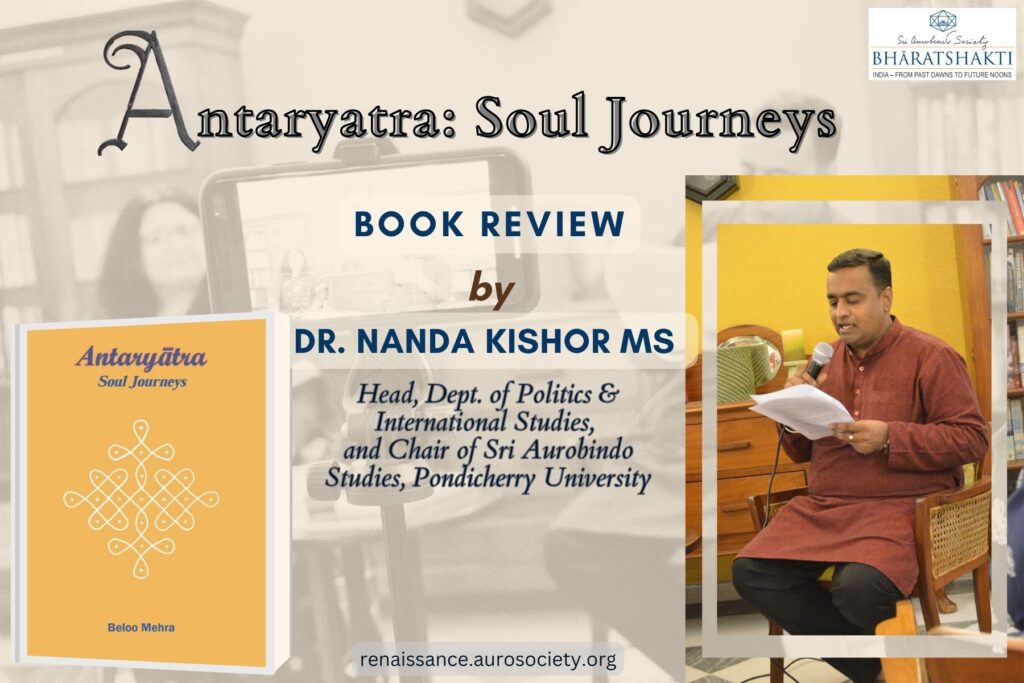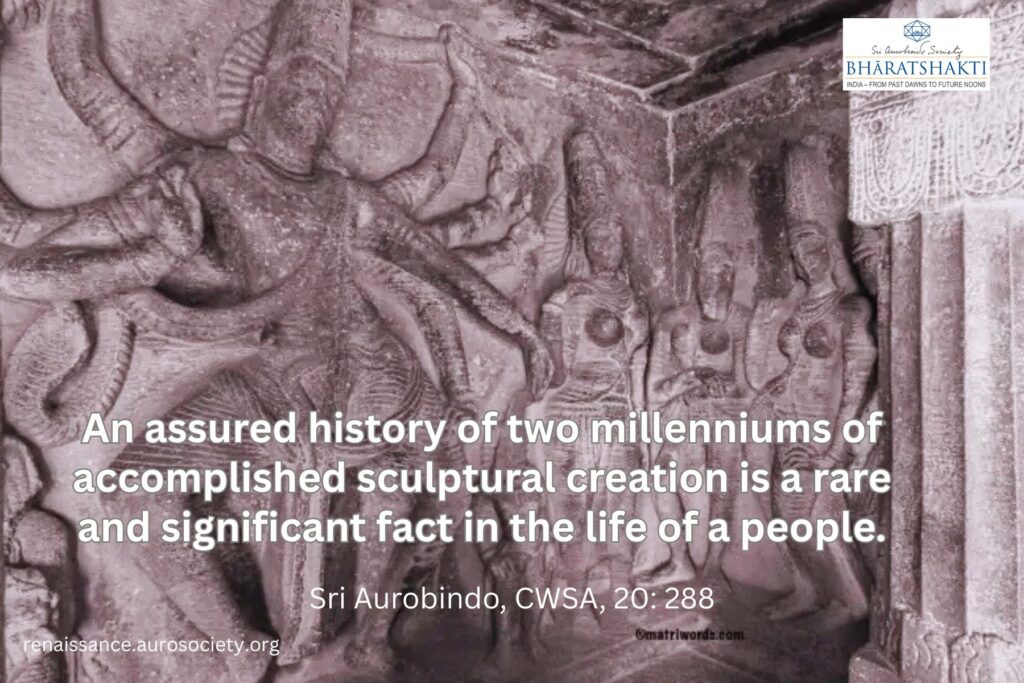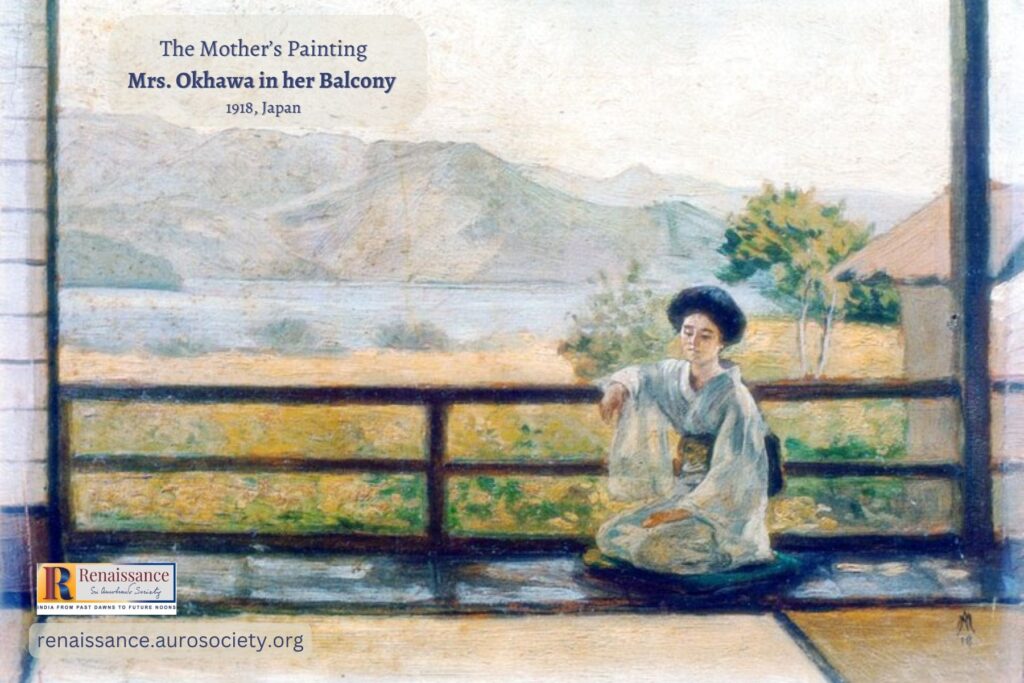Editor’s note: For the ‘Book of the Month’ we again highlight Nirodbaran’s magnificent ‘Twelve Years with Sri Aurobindo‘. The focus this time is on his delightful description of Sri Aurobindo’s suppertime, his second and last meal of the day. This account is from the period after 1938. The following excerpt is from 1972/2005 edition, pp. 48-54 (Sri Aurobindo Ashram Press, Pondicherry).

The day’s second meal, supper, had to be quite light. Let me stress one thing at the very outset: in his whole tenor of life, he followed the rule laid down by the Gita, moderation in everything. This was his teaching as well as his practice. To look at the outward commonplaceness of his life, eating, sleeping, joking, etc., and to make a leaping statement that here was another man like oneself, would be logical, but not true.
Similarly in Sri Aurobindo’s Yoga, even a high experience must not disturb the normal rhythm of life.
Naturally, I was extremely curious, and so were the others, I believe, to see what kind of food he took; had he any preference for a particular dish and how much had he in common with our taste? We had to wait a long time before he regained his health, and could sit up and “enjoy” a proper meal.

Prasād for the devotees
As soon as people learnt about it, dishes from various sadhikas began to pour in as for the Deity in the temple. And just as the Deity does, so did he, or rather the Mother did on his behalf: only a little from a dish was offered to him and all the rest was sent back as prasād.
For his regular meal, there were a few devotees like Amiya, Nolina and Mridu selected by the Mother for their good cooking, which Sri Aurobindo specially liked.
Mridu was a simple Bengali village widow. She, like other ladies here, called Sri Aurobindo her father, and took great pride in cooking for him. Her “father” liked her luchis very much, she would boast, and these creations of hers have been immortalised by him in one of his letters to her.
She was given to maniacal fits of threatening suicide, and Sri Aurobindo would console her with, “If you commit suicide, who will cook luchis for me?” Her cooking got such wide publicity that the house she lived in was named Prasād.
Food from the devotees, though tasty, was sometimes too greasy or spicy, and once it did not agree with him. So a separate kitchen, known as the Mother’s Kitchen, was started for preparing only the Mother’s and Sri Aurobindo’s food. It was done under the most perfect hygienic conditions following the Mother’s own special instructions.
Her insistence is always on cleanliness.
(She said in a recent message: Cleanliness is the first indispensable step towards the supramental manifestation…) I questioned Sri Aurobindo about this: “I wonder why the Divine is so particular about contagion, infection, etc. Is he vulnerable to the virus and the microbe?” He replied, “And why on earth should you expect the Divine to feed himself on germs and bacilli and poisons of all kinds? Singular theology, yours!”
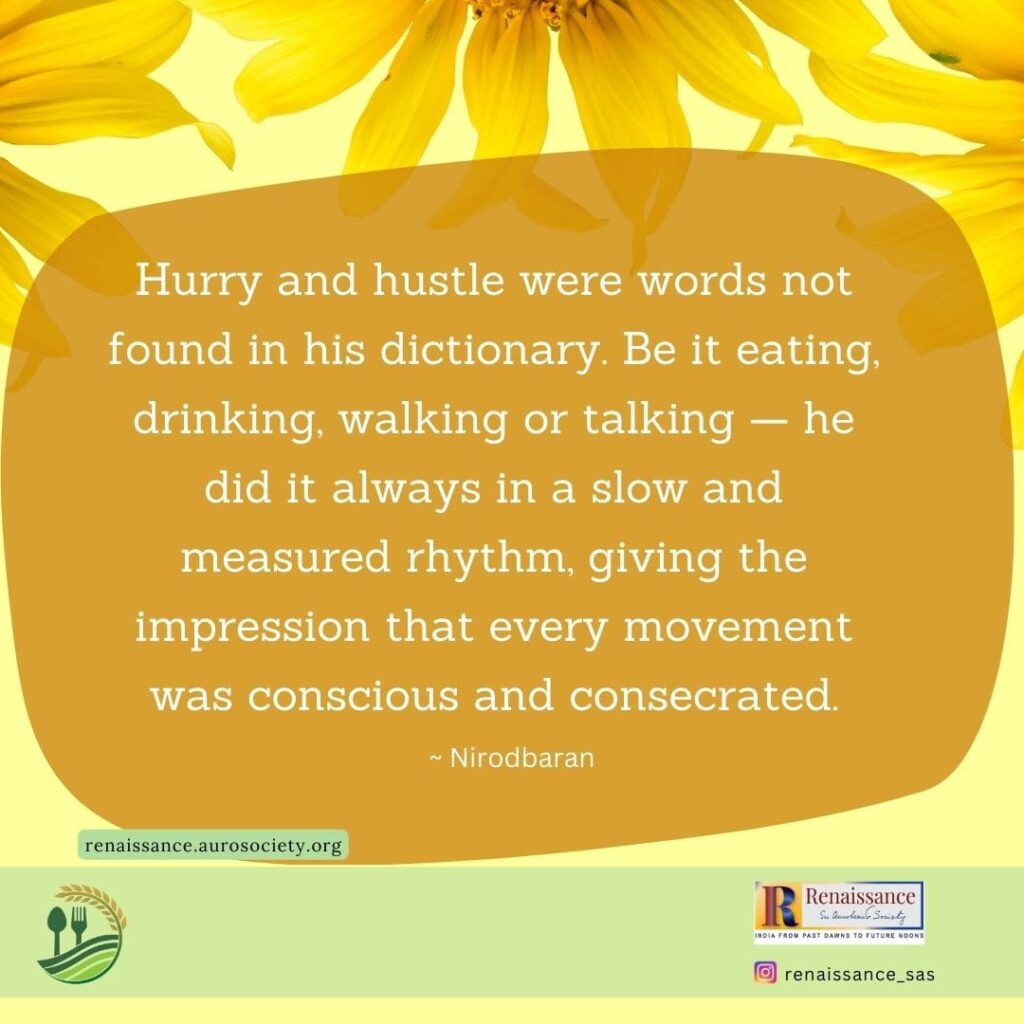
The Mother’s part in serving Sri Aurobindo’s meal
At the beginning all of us would make it a point to be present during his meal and watch the function as well as the Mother’s part in it.
When the time was announced, water was brought for Sri Aurobindo to wash his hands, then he started eating with a spoon and rarely with knife and fork. He would take off his ring, place it in Champaklal’s hand and wash. Champakal would put it back on his finger afterwards. Sometimes when he forgot to take off the ring, Champaklal caught hold of the hand before it was dipped in the water.
Then the Mother would come, prepare and lay the table, push it herself up to Sri Aurobindo and arrange the various foods in bowls or glass tumblers, — in the order of savouries, sweets and fruit juices — everything having an atmosphere of cleanliness, purity and beauty. Then she would offer, one by one, the dishes to the silent Deity who would take them slowly and silently as if the eating was not for the satisfaction of the palate but an act of self-offering.
Steadiness and silence were the characteristic stamps of Sri Aurobindo. Dhīra, according to him, was the ideal of Aryan culture.
Hurry and hustle were words not found in his dictionary. Be it eating, drinking, walking or talking — he did it always in a slow and measured rhythm, giving the impression that every movement was conscious and consecrated.
The Mother would punctuate the silence with queries like, “How do you like that dish?” or such remarks as, “This mushroom is grown here, this is special brinjal sent from Benares, this is butterfruit.” To all, Sri Aurobindo’s reply would be, “Oh, I see! Quite good!” Typically English in manner and tone!
His silence or laconic praise made us wonder if he had not lost all distinction in taste! Did rasagolla, bread and brinjal have the same taste in the Divine sense-experience?
Making this vital point clear, he wrote in a letter:
“Distinction is never lost, bread cannot be as tasty as a luchi, but a yogi can enjoy bread with as much rasa as a luchi — which is quite a different thing.”
He had a liking for sweets, particularly for rasagolla, sandesh and pantua. We could see that clearly: after the Mother had banned all sweets from his menu for medical reasons, one day some pantuas found their way in by chance. The Mother could not send them back from the table. She asked him if he would take some. He replied, “If it is pantua, I can try.”
Since then this became a spicy joke with all of us.
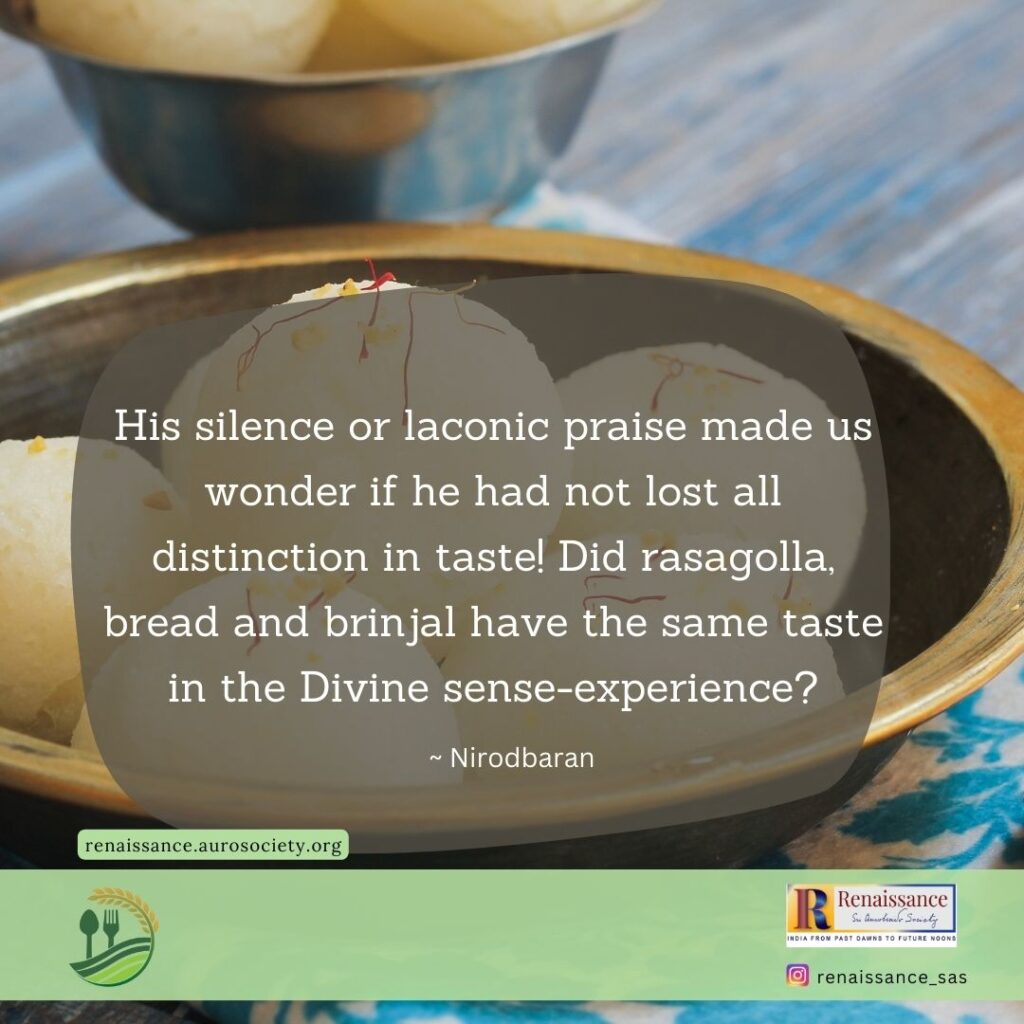
~ Sri Aurobindo, CWSA, Vol. 31, p. 425[Taste] is not a bondage, if there is no attachment. Taste is natural and quite permissible so long as one is not the slave of the palate.

He enjoyed, as a matter of fact, all kinds of good dishes, European or Indian. But whatever was not to his taste, he would just touch and put away.
The pungent preparations of the South could not, however, receive his blessings, except the rasam. When on his arrival in Pondicherry he was given rasam, he enjoyed it very much and said in our talks, “It has a celestial taste!”
He was neither a puritan god nor an epicure; only, he had no hankering or attachment for anything.
His meal ended with a big tumbler of orange juice which he sipped slowly, looking after each sip to see how much was left, and keeping a small quantity as prasād. Once the entire juice had slightly fermented and after one or two sips he left it at the Mother’s prompting. We conspired to make good use of it as prasād, but Sri Aurobindo got the scent of our secret design and forewarned us! We had to check our temptation.
One thing that we noticed was that unless the Mother served him in this way, he would lose all distinction between different preparations and would not know which to take first and in which order. Very probably he would have gone half-fed.
On one occasion we saw him eating a whole cooked green chilly before we could cry halt! Of course, what was one chilly for him who is said in the old days to have taken a lump of opium with impunity! We have also seen him finishing his meal somehow, if for some reason the Mother could not be present and Champaklal had to serve instead.
Luchi-maker Mridu
The story goes that once Mridu’s dish went back without being touched by Sri Aurobindo, and she raised a storm. Sri Aurobindo had to quiet her with the plea that the Mother being absent he did not know what he had taken or what he had not.
On another occasion Sri Aurobindo’s meal being over earlier than usual, Mridu’s dish arrived late and was left untouched. As soon as she heard about it she began to wail “like a new-born babe” as if she would bring down the whole Ashram by her lamentations. Dr. Manilal reported the fact to Sri Aurobindo and he asked, “How did she know about it?” I replied apologetically, “I told her.” He said softly, “These things should not be said;” then he added with a smile, “but it is I who ought to lament for having missed her fine dish.” We all had a good laugh.
One regular interlude during his meal was the arrival of our rampageous luchi-maker, Mridu.
I do not know how she obtained this exceptional privilege. She would come like an innocent lamb with incense and flowers, kneel down in front of the door and wait with folded hands for her “father’s blessings”. On our drawing Sri Aurobindo’s attention to her presence, he would stop eating and cast a quiet glance at her. Her boisterous, unruly nature, would become humble for a while before Sri Aurobindo!
Whenever it was reported that she had manifested her violent temper, which was not infrequent, she was threatened with the loss of this darshan! [. . .]
Also read:
The What and Why of Sattwic Food
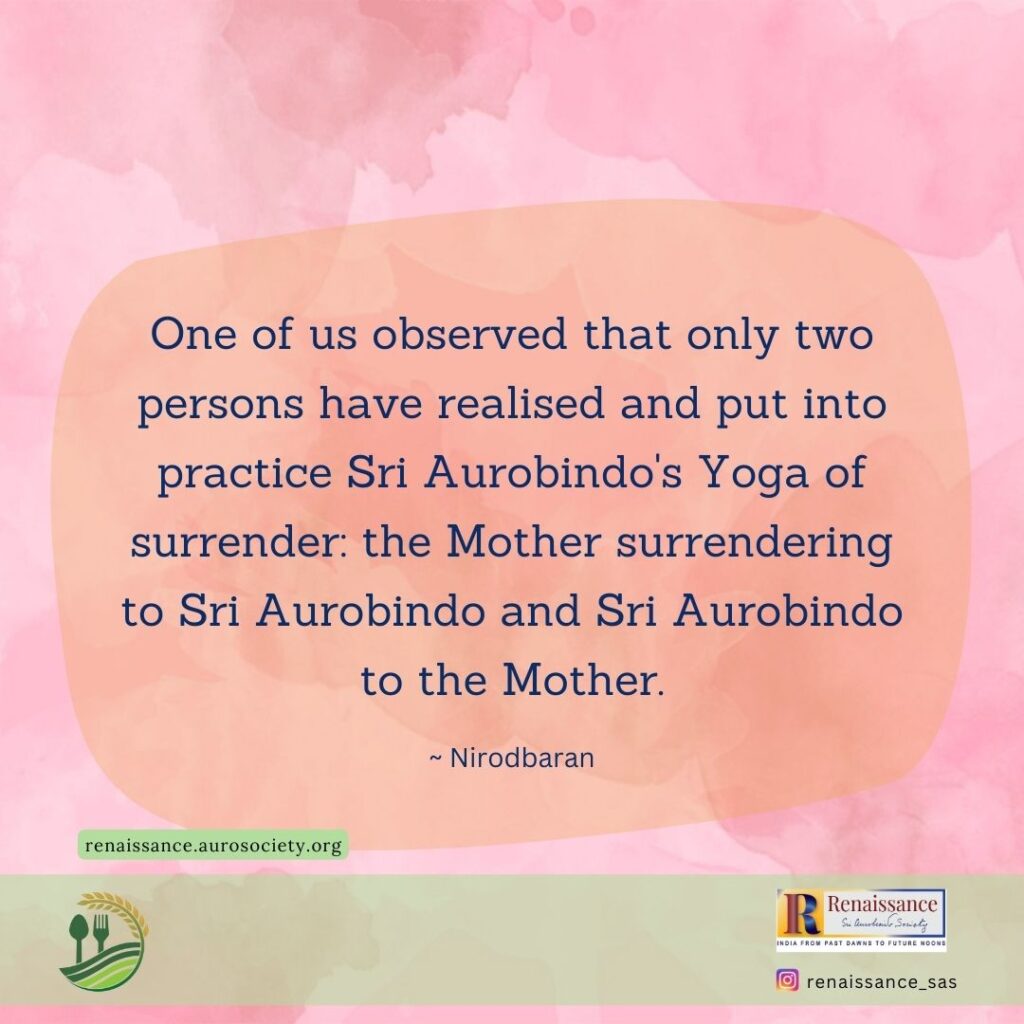
Mealtime conversations
We were rather surprised to notice that milk was excluded from his menu; so was it, we gathered, from the Mother’s — à la Japonaise! There was before the accident, however, a cow popularly called “Sri Aurobindo’s cow”. It was specially taken care of and brought with its calf during the Balcony Darshan for the Mother’s blessings.
While Sri Aurobindo was eating in silence the Mother would speak with him about some general matters or give him reports about people’s illnesses, visitors for Darshan or even minor problems regarding the Ashram life. Sometimes he would also ask the Mother’s opinion concerning medical or other points.
If at any time we pressed our own opinion against the Mother’s, Sri Aurobindo would pull us up saying, “You think Mother does not know?” or “You know more than the Mother?” Similarly, if Sri Aurobindo passed some remark, the Mother would accept it as the last Word. Very often sadhaks used to hear her remark, “Sri Aurobindo said so.” And Sri Aurobindo would quote the Mother’s authority.
Once a sadhak wanted to do something in a particular way; the Mother almost consented, but on hearing Sri Aurobindo’s objection, she said, “Oh, you think so? Then it can’t be done!”
To both of them, the other’s word was the law.
One of us observed that only two persons have realised and put into practice Sri Aurobindo’s Yoga of surrender: the Mother surrendering to Sri Aurobindo and Sri Aurobindo to the Mother.
~ Design: Beloo Mehra

